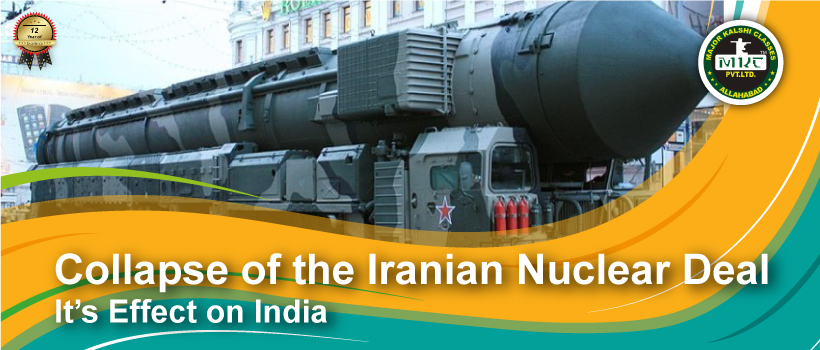Collapse of the Iranian Nuclear Deal: It’s Effect on India
The Iran Nuclear Deal is also known as the Joint Comprehensive Plan of Action. The main aim of this deal is to ensure that Tehran’s nuclear program will be as peaceful as possible. In return, it lifted the U.N. Security Council and various other sanctions in several areas, including trade, technology, energy, and finance. This deal was sealed in the month of July 2015 under President Barack Obama.
Who Signed Iran Nuclear Deal?
Iran signed this agreement with the five permanent members of the U.N. Security Council, including the U.S., Russia, China, France, the United Kingdom, Germany, and the European Union.
Why Iran Nuclear Deal is Controversial?
In the month of May 2018, there was board consensus that Iran has abided by the agreement. The prime minister of Israeli – Benjamin Netanyahu, has alleged that “Iran lied” about its nuclear weapon ambitions in the 2000s. The information shared by the PM seemed to match up with what nuclear inspector had already reported about Tehran’s program.
Critics claim that Iran nuclear deal is flawed and does not prevent Iran from engaging in aggressive actions that fall outside the pact’s purview. The president of the United States of America – Donald Trump has made no secret of his dislike for the agreement and also called it “the worst deal ever”. In addition to this, Trump announced the U.S. would reimpose sanctions on Iran that leave other nations involved scrambling to salvage the pact. Restoring sanctions amount to the U.S. breach of the original deal whereas Iran was deemed to be compliant – as per the international nuclear inspectors.
On the other hand, some experts believe that Iran nuclear deal is good for denuclearizing North Korea.
Why Does Mr. Trump against Iran Nuclear Deal?
In the Month of May on a TV, the president denounced that JCPOA as a horrible. He said that “it is a one-sided deal that should not be made.” In addition to this, he also said that it had placed “very weak limits on the regime’s nuclear activity and no limits at all on its other malign behaviour, including its sinister activities in Syria, Yemen and other places across the world”.
According to the intelligence documents published by Israel, Mr. Trump also said that “at the heart of the Iran deal is a fiction that Iran only desired a peaceful nuclear energy programme”. He also added that the accord’s so-called “sunset clauses” – under which key limits on Iran’s nuclear programme will start to expire – were “totally unacceptable”.
How India could be affected by the U.S. decision on Iran Nuclear Deal?
Apart from the U.S., the other major countries like the U.K., France, Germany, Russia, China, and the European Union remain committed to Iran Nuclear Deal. However, the decision of U.S. affects India in these ways:
Oil Prices: The impact on world oil prices will be visible impact of the U.S. decision. Today, Iran is India’s third biggest supplier after Iraq and Saudi Arabia and any increase in the prices of oil will hit both inflation level and Indian rupee, which breached ₹67 to the U.S. dollar this week.
Chabahar: According to a report, India has already committed about $85 million to Chabahar development with plans for a total of $500 million on the port. On the other hand, the railway line to Afghanistan could cost up to $1.6 billion.
INSTC: Apart from Chabahar, India has been a founder of the International North South Transport Corridor (INSTC). Its main aim is to cut right across Central Asia to Russia over a 7,200 km multi-mode network, reduce transportation and time taken by trade by about 30%.
Shanghai Cooperation Organization: Last year, India and Pakistan joined the SCO and both will be formally admitted in June 2018 when PM of India went to the Chinese city of Qingdao for the SCO summit. China says that it will consider inducting Iran into the 8-member Eurasian security organization. The proposal is led by China and Russia. If it is accepted by SCO, India will become a member of a bloc and will run counter to some of the government’s other initiatives, including Indo-Pacific quadrilateral with the U.S., Australia, and Japan.
Rules-Based Order: India has been a proponent of a “rules-based order” that depends on multilateral consensus as well as an adherence to commitments made by several countries on the international stage. The Obama administration had signed the JCPOA which overturned the precept that such international agreements are made by “States”, not with governments or regimes. This might impact on all agreements.
We hope that this blog provides you with all the required details about the Collapse of the Iran Nuclear Deal: It’s Effect on India. If you are a candidate preparing for Defence Forces, avail the Best Books or Study Material from MKC Publications. For further inquiry, feel free to call us on +91 9696330033/9696220022 or
Visit us via:
- Our Official website
- Or at Shapath Building, 105/244, Tagore Town, Allahabad – 211002
To get detailed information on Notifications, Syllabus, Tips and Tricks, Admit Card Dates, Result, Cut off, Trend Analysis, Information about Physical Fitness Test and Medical Examination and Current Affairs, simply Visit Our YouTube Channel. You can also follow us on Instagram.
Feel free to share your thoughts about this blog in the comment section given below.








